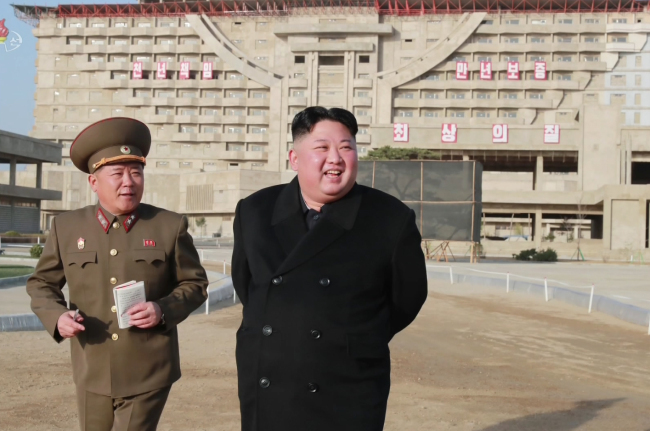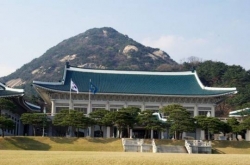North Korea fired a barrage of unidentified short-range projectiles into the East Sea on Saturday, South Korea's Joint Chiefs of Staff (JCS) said, in apparent saber-rattling amid stalled nuclear talks with the United States.
The JCS had earlier said the North fired multiple short-range "missiles" but later revised the announcement to portray what were fired only as "projectiles." The projectiles were fired from areas near the east coast town of Wonsan between 9:06 a.m. and 9:27 a.m., the JCS said.
The change suggests the firings could have involved multiple rocket launchers, not missiles.
"What the North fired this time is not a ballistic missile," a military officer said.
 |
North Korea's Kim Jong-un (Yonhap) |
The projectiles flew about 70 kilometers to 200 kilometers, the JCS said, adding that South Korean and US authorities are analyzing details of the projectiles and the intention behind the firings.
"Our military has been closely watching North Korea's movements and has maintained a full-fledged posture in close coordination with the US," the JCS said.
Last month, North Korea test-fired what it called "the new tactical guided weapon," which, according to Seoul authorities, appeared to be a guided weapon for ground combat.
The North last conducted a ballistic missile launch in November 2017, when it test-fired the Hwasong-15 intercontinental ballistic missile (ICBM). Pyongyang has since been refraining from ballistic missile launches that constitute a violation of UN resolutions.
Analysts said the North appears to have fired projectiles from its 300-mm multiple launch rocket system as part of its artillery units' drills or to test the weapons system for improvement.
In March 2014, Pyongyang fired four short-range projectiles believed to be shells from the launch system, which flew around 150 kilometers.
"What the North fired today showed similar trajectories to those fired in 2014," the military officer noted.
Saturday's firings were seen as a message to the US amid a deadlock in their denuclearization negotiations. February's summit in Hanoi between US President Donald Trump and North Korean leader Kim Jong-un collapsed without a deal.
The North wants sanctions relief in exchange for partial denuclearization measures. But the US has rejected the demand,
insisting it won't relax sanctions until the communist nation's complete denuclearization.
Last month, the North's leader Kim said in a key policy speech that he is willing to hold another summit with Trump if the US changes its hard-line stance and comes up with a new proposal acceptable to him.
In response, South Korea called on the North to halt all activities that could flare up military tensions on the Korean Peninsula.
After holding an emergency meeting involving top security officials, the presidential office said the latest launch "runs counter to the inter-Korean military agreement signed in September," and a source of "grave concern," according to presidential spokesperson Ko Min-jung.
Under the Comprehensive Military Agreement signed on the sidelines of the third summit between President Moon Jae-in and North Korean leader Kim Jong-un in Pyongyang, the two countries vowed a series of trust-building and arms control measures under a broader scheme to halt all hostile acts against each other.
Vowing to strengthen its surveillance posture in close coordination with the US and maintain close communications with neighboring countries, Cheong Wa Dae said it "expects North Korea to proactively join efforts for the swift resumption of dialogue."
In Washington, the White House said it is aware of North Korea's launch of short-range projectiles and will keep tabs on the situation.
"We are aware of North Korea's actions tonight," White House press secretary Sarah Sanders said in a statement. "We will continue to monitor as necessary." (Yonhap)

![[Newsmaker] N. Korea chides THAAD training by USFK](http://res.heraldm.com/phpwas/restmb_idxmake.php?idx=605&simg=/content/image/2019/05/03/20190503000518_0.jpg)







![[KH Explains] For Korean automakers, Chinese EVs may loom larger than Trump’s tariffs](http://res.heraldm.com/phpwas/restmb_idxmake.php?idx=644&simg=/content/image/2024/11/14/20241114050537_0.jpg)
![[Graphic News] Tainan predicted top destination for South Koreans in 2025](http://res.heraldm.com/phpwas/restmb_idxmake.php?idx=644&simg=/content/image/2024/11/13/20241113050807_0.gif)

![[Herald Review] Cho Seung-woo takes 'Hamlet' crown](http://res.heraldm.com/phpwas/restmb_idxmake.php?idx=644&simg=/content/image/2024/11/14/20241114050593_0.jpg)